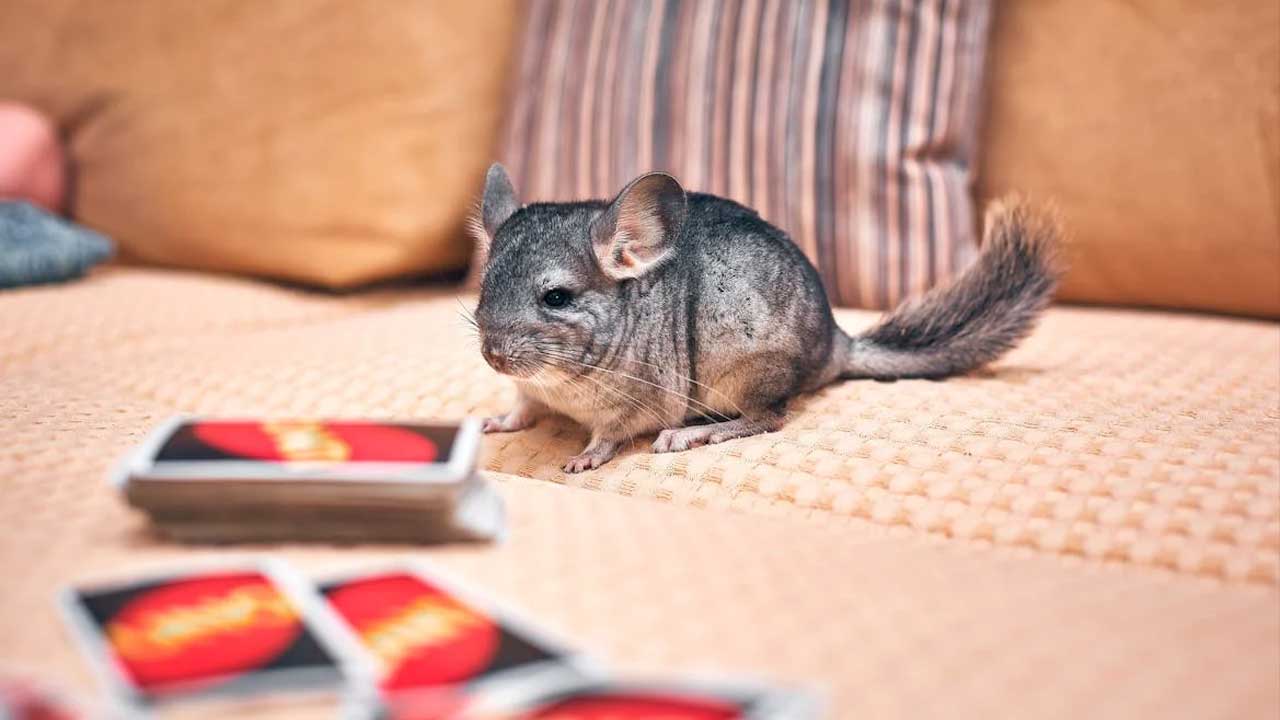Chinchillas are adorable rodents that have earned a special place in the hearts of many pet lovers. Although they may be small in size, their personality and needs are big. In this article, we will explore everything you need to know about chinchilla care to ensure they live a happy and healthy life in your home.
- Scientific name: Chinchilla lanigera and Chinchilla brevicaudata
- Origin: Mountainous regions of South America
- Size: 25 and 35 centimeters in length.
- Colors: Grey, white, black, and various intermediate shades.
- Difficulty of care: Moderate
- Life expectancy: 10 to 15 years.
Responsible choice of a chinchilla as a pet
Before adopting a chinchilla, consider the following:
- Evaluate the time available to dedicate to it.
- Make sure you have enough space in your home for their cage and games.
- Verify that you have the financial resources necessary for their veterinary care and food.
- Find out if the chinchilla is compatible with your lifestyle and schedule.
Chinchilla breeds and species
The two main species of chinchilla are Chinchilla lanigera and Chinchilla brevicaudata . Both have similar characteristics but differ slightly in size and coloration.
Chinchilla Habitat and Housing
For a chinchilla, its rodent cage is its world. Make sure you provide a large, safe space that includes:
- Platforms and tubes to climb and explore.
- Bed of shavings for rodents or, failing that, paper.
- Hay or hay ball holder to have a clean feed.
- Toys and elements for environmental enrichment.
In addition, it is advisable to take it out of the cage daily, and offer it a territory to explore, you can put a rodent park or several, to ensure that it does not get hurt and in this way, get it out of its routine and stimulate it mentally.
Food for chinchillas
Food is essential to take care of the health of chinchillas. It is important to provide quality rodent feed specifically for chinchillas, as well as hay and small amounts of fresh fruits and vegetables.
Avoid fatty and sugary foods as they can cause health problems. We have a longer article about their diet: What can chinchillas eat? But, in general terms, their diet is based on:
- 5% vegetables and fruits.
- 75% hay.
- 20% feed or pellets (30 grams per day).
Health and care
Caring for the health of chinchillas is essential to ensure their well-being throughout their lives. In addition to keeping your vaccination and deworming schedule up to date, it’s important to watch for any signs of illness. Some common symptoms of illness in chinchillas include changes in appetite, weight loss, runny nose, diarrhea, and behavioral changes such as apathy or aggression.
If you notice any of these symptoms in your chinchilla, it is crucial to take it to a veterinarian who specializes in exotic animals as soon as possible. Veterinarians with experience in small mammals will be able to make an accurate diagnosis and offer the appropriate treatment to guarantee the speedy recovery of your furry friend.
Additionally, it is important to provide chinchillas with a clean and safe environment to prevent illness. Keeping their cage clean, providing a balanced diet, and ensuring they have enough exercise and environmental enrichment are key steps to keeping their health in optimal condition.
Additionally, due to their fine and abundant fur, chinchillas need recurring sand baths to care for their skin and avoid skin problems.
Behavior and socialization
Chinchillas are curious and intelligent animals that enjoy exploring their environment and interacting with their caregivers. To promote their emotional well-being, it is important to spend time socializing and training your chinchilla from an early age.
A good way to socialize with a chinchilla is to spend time interacting with it daily, providing treats and toys to stimulate its mind. It is also important to handle them gently and avoid stressful situations that may cause anxiety.
As for training, chinchillas can learn a variety of tricks and behaviors through the use of positive reinforcement, such as rodent treats and praise. Training your chinchilla will not only strengthen the bond between you, but it will also provide mental stimulation and enrichment.
Enrichment and toys
Providing your chinchilla with a variety of toys and accessories is essential to keeping it happy and healthy. Rodent toys such as exercise wheels, tunnels, ladders, and hay balls are great options to stimulate their mind and promote physical exercise.
In addition to toys, it is also important to provide your chinchilla with environmental enrichment in its cage. This can include natural branches to gnaw on, hiding places, and climbing platforms. Regularly changing the toys and accessories in his cage can also help prevent boredom and keep his mind active.
Coexistence with other pets and children
Introducing your chinchilla to other pets and children in the home can be an enriching experience, but it is important to do it gradually and with supervision. Introduce your chinchilla to other furry companions slowly and observe their behavior to make sure they feel comfortable and safe.
When it comes to children, teach them to interact with your chinchilla safely and respectfully. Always supervise interactions between children and chinchillas. Explain how they should handle it correctly to avoid injuries to both the animal and the child and take the opportunity to instill animal values and empathy in them.






